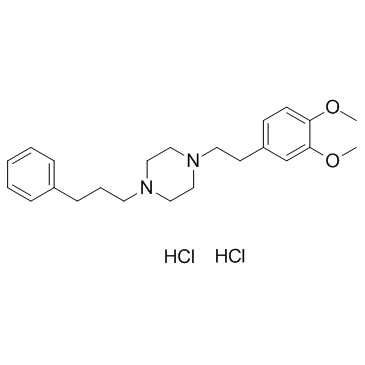SA 4503 dihydrochloride
Modify Date: 2024-01-05 17:24:01

SA 4503 dihydrochloride structure
|
Common Name | SA 4503 dihydrochloride | ||
|---|---|---|---|---|
| CAS Number | 165377-44-6 | Molecular Weight | 441.434 | |
| Density | N/A | Boiling Point | 499.2ºC at 760 mmHg | |
| Molecular Formula | C23H34Cl2N2O2 | Melting Point | N/A | |
| MSDS | N/A | Flash Point | 137.3ºC | |
Use of SA 4503 dihydrochlorideCutamesine dihydrochloride (SA4503 dihydrochloride) is a potent Sigma 1 receptor agonist with an IC50 of 17.4 nM in guinea pig brain membranes. |
| Name | 1-(3,4-Dimethoxyphenethyl)-4-(3-phenylpropyl)piperazine dihydrochloride |
|---|---|
| Synonym | More Synonyms |
| Description | Cutamesine dihydrochloride (SA4503 dihydrochloride) is a potent Sigma 1 receptor agonist with an IC50 of 17.4 nM in guinea pig brain membranes. |
|---|---|
| Related Catalog | |
| Target |
IC50: 17.4 nM (σ1receptor, guinea pig brain membranes)[1] |
| In Vitro | The sigma receptor might be involved in several diseases in the central nervous system. Cutamesine, a potent σ1receptor agonist, has 103-fold higher affinity for σ1 (IC50=17.4 nM) than σ2 (IC50=1,784 nM) sites in guinea pig brain membranes. Cutamesine is 14-fold selective for σ1 (Ki=4.6 nM) over σ2 (Ki=63.1 nM) sites in guinea pig brain homogenates[1]. Cutamesine protects motor neuron NSC34 cells against superoxide dismutase 1 and serum free neurotoxicity. It upregulates the phosphorylation levels of Akt and extracellular signal-regulated kinase (ERK) 1/2[2]. Cutamesine reduces the activation of the MAPK/ERK pathway and down-regulated the ionotropic glutamate receptor, GluR1[3]. |
| In Vivo | Cutamesine extends the survival time in the SOD1G93A mice[2]. |
| Cell Assay | The NSC34 cells are seeded at a density of 7000 cells per well into 96-well plates with D-MEM and transfected using Lipofectamine 2000 mixed with 2 μg /mL of plasmid vector in D-MEM for 6 h. After 6 h, the cell-culture medium is replaced with fresh D-MEM and culture and allowed to proceed for a further 42 h. The cells are then transferred to serum-free D-MEM and immediately treated with Cutamesine at a final concentration of 1, 3, or 10 nM[2]. |
| Animal Admin | Mice: Transgenic female mice overexpressing mutated human SOD1G93A are used in the study. Cutamesine is dissolved in saline and subcutaneously administered at a dose of 1 mg/kg once daily to 5-week-old SOD1G93A mice to the time of death. In a control group, vehicle (saline) is subcutaneously administered at 10 ml/kg[2]. |
| References |
| Boiling Point | 499.2ºC at 760 mmHg |
|---|---|
| Molecular Formula | C23H34Cl2N2O2 |
| Molecular Weight | 441.434 |
| Flash Point | 137.3ºC |
| Exact Mass | 440.199738 |
| PSA | 24.94000 |
| LogP | 4.97650 |
| Vapour Pressure | 4.25E-10mmHg at 25°C |
| HS Code | 2933599090 |
|---|
| HS Code | 2933599090 |
|---|---|
| Summary | 2933599090. other compounds containing a pyrimidine ring (whether or not hydrogenated) or piperazine ring in the structure. VAT:17.0%. Tax rebate rate:13.0%. . MFN tariff:6.5%. General tariff:20.0% |
| 1-[2-(3,4-dimethoxyphenyl)ethyl]-4-(3-phenylpropyl)piperazine,dihydrochloride |
| 1-(3,4-Dimethoxyphenethyl)-4-(3-phenylpropyl)piperazinedihydrochloride |
| Piperazine, 1-[2-(3,4-dimethoxyphenyl)ethyl]-4-(3-phenylpropyl)-, hydrochloride (1:2) |
| 1-[2-(3,4-Dimethoxyphenyl)ethyl]-4-(3-phenylpropyl)piperazine dihydrochloride |
| SA-4503 |
| SA4503 2HCl |
| SA4503 (dihydrochloride) |

